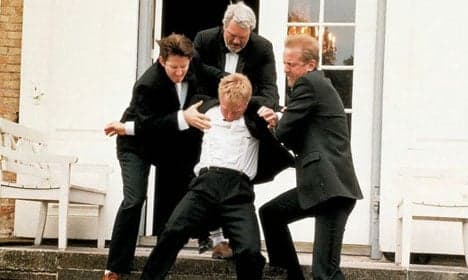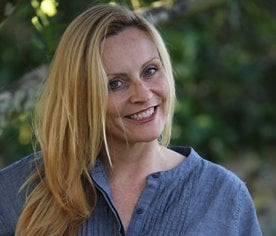Why happy endings don’t make us happy

The Local's opinion columnist Jessica Alexander writes that if you really want to feel better about yourself, you should skip the sugary Hollywood films and opt for a Danish downer.
Have you ever left a feel-good movie without actually feeling so good? A feeling in which, despite the great ending, somewhere deep inside yourself you had the inkling that your life wasn’t that great? Your relationship, your house, your car or your clothes just weren’t as good as in the film?
A large majority of Hollywood films are intended to make you feel good. But if art imitates life one wonders how realistic these syrupy-sweet endings actually are.
Danish films on the other hand, often have dreary, sad or tragic endings. Many times I have watched Danish films and waited to hear that soothing background music that would signal my suffering was about to end and everything would turn out all right after all. The boy would get the girl, the hero would save the day and all would be ok in the end.
As an American, I almost felt it was my right to get a happy ending. But time and time again, the Danish films would touch on sensitive, real and painful issues without wrapping them up with a nice bow, lid closed, packaged up into the gift of a great life ahead. On the contrary, they left me with my raw emotions flapping in the wind, wondering what to do with them. How could Danes be so happy watching films like this? If art imitated life what was I to think?
Research shows that watching tragic or sad movies can actually make people happier because it brings attention to the more positive aspects of their own lives. It tends to make them reflect on their relationships in a ‘count your blessings’ kind of way.
Mary Beth Oliver, a professor of the positive psychology movement, has identified many eudaemonic rewards of watching depressing, stressful or even horrific stories. Eudaemonia is a term coined by Aristotle that defines the meaningfulness, insight and emotions that put us in touch with our own humanity. Eudaemonia can enrich us and perhaps even teach us something about ourselves. Aristotle believed that happiness was more related to the virtue of our character and striving for human good. This involves being in touch with our authentic selves and not numbing ourselves or escaping into false realities.
Even in the fairy tale world, it isn’t always so rosy in Denmark. Hans Christian Andersen, arguably history’s most famous Dane, has had several of his fairy tales modified to fit what some adults consider to be more acceptable for children. The original Little Mermaid for example, doesn’t get the prince in the end but rather dies from sadness and turns into sea foam.
Danes believe that tragedies and upsetting events are something we should talk about too. They don’t believe they have to be glossed over for adults or for children. If you consider that we learn more about character from our suffering than our successes, it makes sense that we should examine all parts of life, also with kids. This has been proven to build empathy and a deeper respect for humanity. It also helps us feel gratitude for the simpler things that we sometimes take for granted when we focus too much on the fairy-tale life.
So the next time you are choosing a film, consider watching a Danish one. It may punch you in the face and kick you in the stomach with its bleak window into humanity. But you might just walk away afterwards and think, “Hey, my life is pretty good after all!”
The Danes know that how we reframe our perspective on life can make the biggest difference in how we feel about it anyway. It’s not just about getting a happy ending. It’s about being able to appreciate the journey along the way – with all its magnificent peaks and valleys.
 Jessica Alexander is an American author who co-wrote 'The Danish Way of Parenting: A Guide to Raising the Happiest Kids in the World'. She has been married to a Dane for over 13 years and has always been fascinated by cultural differences. She speaks four languages and currently lives in Rome with her husband and two children. Her book can be purchased via Amazon and Saxo.
Jessica Alexander is an American author who co-wrote 'The Danish Way of Parenting: A Guide to Raising the Happiest Kids in the World'. She has been married to a Dane for over 13 years and has always been fascinated by cultural differences. She speaks four languages and currently lives in Rome with her husband and two children. Her book can be purchased via Amazon and Saxo.
Comments
See Also
Have you ever left a feel-good movie without actually feeling so good? A feeling in which, despite the great ending, somewhere deep inside yourself you had the inkling that your life wasn’t that great? Your relationship, your house, your car or your clothes just weren’t as good as in the film?
A large majority of Hollywood films are intended to make you feel good. But if art imitates life one wonders how realistic these syrupy-sweet endings actually are.
Danish films on the other hand, often have dreary, sad or tragic endings. Many times I have watched Danish films and waited to hear that soothing background music that would signal my suffering was about to end and everything would turn out all right after all. The boy would get the girl, the hero would save the day and all would be ok in the end.
As an American, I almost felt it was my right to get a happy ending. But time and time again, the Danish films would touch on sensitive, real and painful issues without wrapping them up with a nice bow, lid closed, packaged up into the gift of a great life ahead. On the contrary, they left me with my raw emotions flapping in the wind, wondering what to do with them. How could Danes be so happy watching films like this? If art imitated life what was I to think?
Research shows that watching tragic or sad movies can actually make people happier because it brings attention to the more positive aspects of their own lives. It tends to make them reflect on their relationships in a ‘count your blessings’ kind of way.
Mary Beth Oliver, a professor of the positive psychology movement, has identified many eudaemonic rewards of watching depressing, stressful or even horrific stories. Eudaemonia is a term coined by Aristotle that defines the meaningfulness, insight and emotions that put us in touch with our own humanity. Eudaemonia can enrich us and perhaps even teach us something about ourselves. Aristotle believed that happiness was more related to the virtue of our character and striving for human good. This involves being in touch with our authentic selves and not numbing ourselves or escaping into false realities.
Even in the fairy tale world, it isn’t always so rosy in Denmark. Hans Christian Andersen, arguably history’s most famous Dane, has had several of his fairy tales modified to fit what some adults consider to be more acceptable for children. The original Little Mermaid for example, doesn’t get the prince in the end but rather dies from sadness and turns into sea foam.
Danes believe that tragedies and upsetting events are something we should talk about too. They don’t believe they have to be glossed over for adults or for children. If you consider that we learn more about character from our suffering than our successes, it makes sense that we should examine all parts of life, also with kids. This has been proven to build empathy and a deeper respect for humanity. It also helps us feel gratitude for the simpler things that we sometimes take for granted when we focus too much on the fairy-tale life.
So the next time you are choosing a film, consider watching a Danish one. It may punch you in the face and kick you in the stomach with its bleak window into humanity. But you might just walk away afterwards and think, “Hey, my life is pretty good after all!”
The Danes know that how we reframe our perspective on life can make the biggest difference in how we feel about it anyway. It’s not just about getting a happy ending. It’s about being able to appreciate the journey along the way – with all its magnificent peaks and valleys.
 Jessica Alexander is an American author who co-wrote 'The Danish Way of Parenting: A Guide to Raising the Happiest Kids in the World'. She has been married to a Dane for over 13 years and has always been fascinated by cultural differences. She speaks four languages and currently lives in Rome with her husband and two children. Her book can be purchased via Amazon and Saxo.
Jessica Alexander is an American author who co-wrote 'The Danish Way of Parenting: A Guide to Raising the Happiest Kids in the World'. She has been married to a Dane for over 13 years and has always been fascinated by cultural differences. She speaks four languages and currently lives in Rome with her husband and two children. Her book can be purchased via Amazon and Saxo.
Join the conversation in our comments section below. Share your own views and experience and if you have a question or suggestion for our journalists then email us at [email protected].
Please keep comments civil, constructive and on topic – and make sure to read our terms of use before getting involved.
Please log in here to leave a comment.